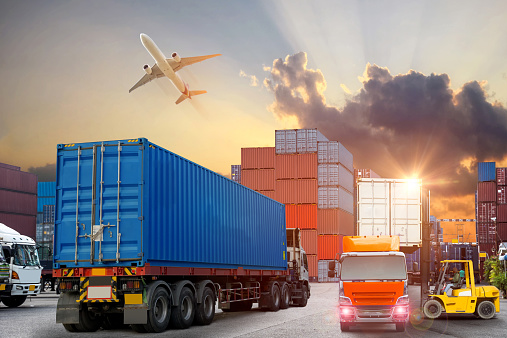10 Ways to Make Your Logistics Operations More Eco-Friendly

With increasing global awareness of environmental issues, companies in all industries are trying to find ways to operate more sustainably. The logistics sector, depending on the transport, warehouse, and supply chain activities, is one of these industries. For a logistics company in Kolkata, where rapid urbanization and traffic congestion are some additional challenges, it is not only strictly eco-friendly but also offers cost-saving and operationally effective avenues for such practices.
This blog focuses on 10 practical measures through which logistics companies based in Kolkata can change their operations from a loser to greener operations, whilst still being effective and meeting customer demands.
1. Optimize Transportation Routes
Transport is one of the biggest carbon footprint contributors in a logistics company, as fuel is wasted driving inefficient routes. It contributes to a great extent the pollution levels in the air; thus, not only is it a waste but also a resource and cost drain.
How to Implement: By means of technology such as route optimization software, a company would be able to plan the most effective delivery routes. These tools analyze factors such as traffic patterns, weather conditions, and road closures, allowing drivers to circumvent delays and extra detours.
Benefit: Reduced fuel consumption, lowered emissions, and faster deliveries.
2. Switch to Electric or Hybrid Vehicles
E-mobility of vehicles or hybridization is a step toward cleaning emissions of transport. A city like Kolkata, which is becoming an increasingly concerning place regarding air quality, could make a difference by going greener with vehicles.
How to Implement: A logistics company in Kolkata can start blending electric (EVs) or hybrid vehicles gradually for last-mile delivery and local shipment. Governments would be offering subsidies for such businesses to offset their investment for most countries with this transition.
Benefit: The reduction of our carbon footprint, reduced reliance on fossil fuels, and reduced cost to fuel over time.
3. Adopt Sustainable Packaging Materials
Packaging plays a significant part in the logistics industry. Excessive use of non-recyclable or non-biodegradable materials causes landfill waste. Sustainable packing can quickly reduce the environmental impact of any logistics company.
How to Implement: Switch to biodegradable or recyclable materials like cardboard, paper, or plant-based plastics. Encourage the customers by providing incentives to return packaging for reuse. Use smaller, more compact forms of packaging that reduce use while giving more shipping space.
Benefit: Reduced waste and carbon footprints as well as a better image for the company.
4. Implement Energy-Efficient Warehousing
Warehouses generally consume high energy for the lighting, heating, cooling, and functionalities of equipment as well. Optimizing energy usage in warehouses is one of the best ways through which the environmental impact of logistics can be reduced.
How to Implement: Using energy-efficient lighting such as LED bulbs and dimmers for motion sensors to minimize energy wastage. Install solar panels for renewables. Use automated systems for heating and cooling to ensure that energy would only be used when necessary.
Benefit: Decreasing electricity consumption through the operation cost and smaller carbon footprints.
5. Use Eco-Friendly Packaging Solutions
Logistics operations mostly depend on packaging materials that tend to affect environmental sustainability. By choosing eco-friendly packaging, logistics companies can promote positive waste reduction and benefit the environment.
How to Implement: Using compostable or biodegradable alternatives to plastic. Reduce packaging size and employ innovative packaging to minimize waste. Refillable or returnable packaging for bulk goods.
Benefit: Reduced environmental waste, less energy consumption, and improved sustainability.
6. Embrace Paperless Documentation
A collateral for the logistics sector can be paper documentation which can pile up so fast, for example, bills of lading, invoices, delivery receipts, and so on. Unnecessary paper usage can be a bit wasteful. By going for digital documentation in logistics, companies can have an immense reduction in paper consumption and make operations much more efficient.
How to Implement: Adoption of cloud-based platforms for tracking orders, shipment management, and invoicing. Encourage customers and vendors to adopt digital receipts and other documentation.
Benefit: Reduced paper waste, reduced operating costs, and increased efficiency of operation.
7. Promote Reverse Logistics
The fourth type is reverse logistics-the series of return flows or returns and recycling, which brings enormous environmental impact when handled by a logistics company. Such a principle from reverse logistics will enable a corporation to minimize waste, increase recycling and promote sustainability within the company.
How to Implement: Set up systems to collect used packing or returned goods or products for recycling. Work with customers to facilitate the efficient return and, where applicable, further use of products.
Benefit: Less waste in landfill, more sustainability in product life, and cost saving potentials.
8. Encourage Collaborative Logistics
Collaborative logistics is a collective approach where companies utilize resources, for instance, transportation services and warehousing, amongst themselves so that all redundancy in the processes works using the same resources. It allows emission reductions by succeeding in a collaborative way with other companies’ logistics operations.
How to Implement: Partner with some companies to share transportation and warehouses for common goods. Use shared freight networks for long-haul shipments to reduce empty runs of trucks on the road.
Benefit: Lowering emissions, reduced transportation cost, and better utilization of resources.
9. Invest in Green Technology for Fleet Management
Rapidly evolving technologies in fleet management have developed tools that help fleets perform better by ensuring less fuel consumption and harming the environment less. Thus, by investing in green fleet management systems, a logistics company can make sure that their vehicles run efficiently and sustainably.
How to Implement: Install telematics to be able to monitor vehicle performance with real-time fuel efficiency feedback. Utilize data analytics to improve fleet operations, minimize fuel consumption, and maintain vehicles in better condition.
Benefit: Reduced fuel consumption, lower emissions, and prolonged vehicle life.
10.  Switch to Sustainable Last-Mile Delivery Solutions
Switch to Sustainable Last-Mile Delivery Solutions
The segment of last-mile delivery operations remains one of the most resource-consuming areas in logistics. With the rise of e-commerce in Kolkata, the need for speedy and efficient deliveries has been increasing. Unfortunately, such deliveries frequently have a high contribution to pollution, given the high intensity usage of vehicles.
How to Implement: Implement electric bikes or cargo bicycles for last mile deliveries, to reduce emissions. Use smart lockers and collection points to consolidate deliveries and reduce the number of trips. Another idea is to consider the use of drones or autonomous delivery robots for green, low-emission deliveries.
Benefit: Reduce emissions; alleviate traffic congestion; enhance sustainable local delivery systems.
 Conclusion
Conclusion
An overview of the conservation techniques that logistics companies should adopt which needs to be addressed is going to show how important and how imperative it is for the logistics industry, which is undergoing constant change. In India, here are ten approaches for an efficient green logistics practice for a logistics company in Kolkata to begin reducing its environmental footprint, save cash for the future, and even improve operational effectiveness: Adjusting transport routes, implementing electric vehicles, or such sustainable packaging solutions – everything makes a notch towards greener practice.
These practices do bring and lead greener environments; they would really pay back your logistics business with a reputation able to attract eco-conscious customers to it in the long term. The city will keep growing and posing new environmental challenges and requirements for the logistics companies to champion more responsible futures.



